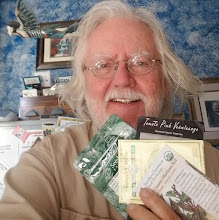 |
| Ms Bee, Lacking a Horse, Pollinates a Borage Plant |
A recent LA Times article detailed the death of a horse and the owner being severely stung by bees has drawn enough attention to warrant a reply.
The reason such a story becomes news is that it is uncommon. For some reason, unclear in the story, the bees attacked this man and his horse. It was doubtful that the attack was unprovoked and, because the man has a reason to not disclose anything he might have done to provoke the attack, we may never know the truth. But, from my personal experience of working with hives of bees and the many years of experience with bees by the people I associate with and our collective memory, we, to a person, allow that this is not consistent with the way we know bees to behave without some serious provocation. Because most Americans simply regard bees as something to be feared and really know very little about them, even preposterous stories about their behavior invoke no intelligent scrutiny.
But, OK. So the bees got pissed off – we don't know why – and they stung the horse to death and sent the owner off to the emergency room. This is only 'news' because it is rare. A horse killed on the freeway would be rare too, but a man sent to the ER because of injuries sustained on the freeway wouldn't be such a big deal – it wouldn't eve make a back page entry in the LA Times on a slow news day.
Bees are wild critters and they will attack anyone deemed to be threatening their hive. That's what they do. Our reaction to bees is, sadly, overwhelmingly based in fear born of ignorance. A healthy respect for all forms of life is imperative when dealing with the various forms of life we encounter – the more a person knows about bees, bears, wolves, or any form of wildlife, the better a person can deal with it and usually the more appreciation they will have for whatever species we have in mind.
My interactions with bees have been almost always positive. I have had two run-ins where I screwed up (both times) and got stung. I do not blame the bees. Each bee that stung me lost her life (all honey bees with stingers are female and the action of stinging disembowels her) and she lost her life protecting her hive with determination and skill. My work with bees has taught me so much about myself and has shown me some of my faults. I have come to admire these wonderful, essential creatures. The bees and the hive are like two living entities – as much as the cells in my body and two different entities – and the cell cannot live without the rest of the body, but the body needs a minimum number of cells to survive. So it is with the hive.
Most, if not all, hype that pumps up the fear about bees and other wild creatures is conscious fear mongering by those who profit from our fears. I have heard interviews with pest control companies where the president of one company vehemently admonished the radio personality to “very afraid of Africanized honey bees.” The purpose of which was nothing more than to drive listeners to the telephone to call his company every time any bee showed up at their property. After all, who can tell if it's an African bee or a European bee – I mean, I haven't been able to check passports on them. The intention was to frighten people to get ALL bees sprayed.
Never mind that the honey bee is in crises and lack of honey bees will severely impact our food supply. Honey bees have been dying at an alarming rate that has already impacted some crops and threatens shortages of many more. One of every third bite we eat comes to us through the pollinating efforts of honey bees. Mind you, there are other pollinators, and it is increasingly evident we will have to employ them in greater numbers while the honey bee populations plummet, but the honey bee has been the revered pollinator of choice for over a century because we have learned how to work with them and they have proven to be reliable partners even when we have abused them.
It appears to me that the survival of the honey bee is dependent on finding refuge in our cities. Our government has no backbone to contest the chemical and GMO farming lobby, so the honey bee is almost certainly doomed in our farmlands. In the city, where GMOs are not raised and pesticide application is confined mostly to lawns (is that sick or what?), honey bees stand a chance to become viable again. Actions taken by brazen law-breakers like Backwards Beekeepers are probably the greatest hope to keep viable populations of honey bees alive.
Got bees? Do not kill them! Contact a person who will keep them and insure those bees survive to breed more bees. Our way of life is dependent on the honey bee and her pollination of crops from apples to zucchini. Let's not take almonds, peaches, apricots, plums and many other fruits and vegetables away from the children of the future by compromising the honey bee's numbers to not be of service to mankind. Let's legalize beekeeping in all our cities and let's learn about the bees and be of service to them as well.







.jpg)